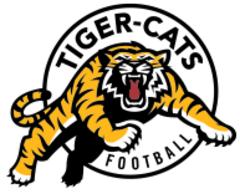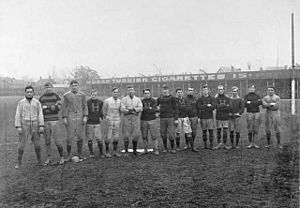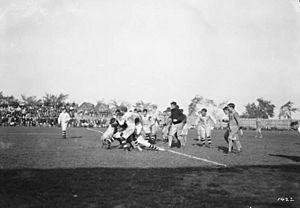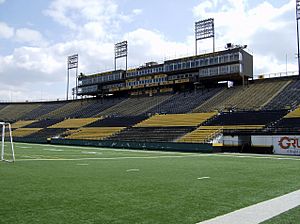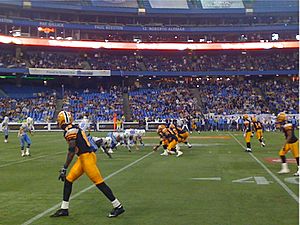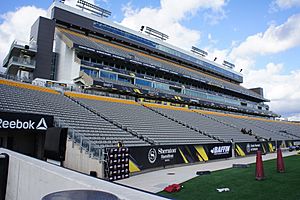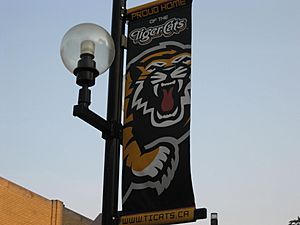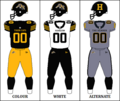Hamilton Tiger-Cats facts for kids
| Established | 1950 |
|---|---|
| Based in | Hamilton, Ontario, Canada |
| Home stadium | Hamilton Stadium (2014–present) |
| Head coach | Scott Milanovich |
| General manager | Ted Goveia |
| Owner(s) | Hamilton Sports Group Bob Young |
| League | Canadian Football League |
| Division | East |
| Colours | Black, gold, white |
| Nickname(s) | Ticats, Cats, Tabbies |
| Grey Cups | 8 (1953, 1957, 1963, 1965, 1967, 1972, 1986, 1999) |
| Current uniform | |
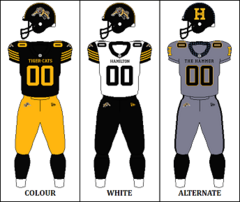 |
|
The Hamilton Tiger-Cats are a professional Canadian football team. They are based in Hamilton, Ontario, Canada. They play in the East Division of the Canadian Football League (CFL). The Tiger-Cats play their home games at Hamilton Stadium.
The team's history goes back to 1869. That's when the Hamilton Football Club was formed. They were called the "Tigers" early on. In 1950, the Tigers joined with another Hamilton team, the Hamilton Wildcats. This merger created the "Tiger-Cats" team we know today.
Since 1950, the Tiger-Cats have won the Grey Cup championship eight times. Their most recent win was in 1999. If you count all the Grey Cups won by Hamilton teams throughout history, the total is 15. This includes wins by the Hamilton Tigers, Hamilton Flying Wildcats, and Hamilton Alerts.
For their first 40 years after the merger, the Tiger-Cats were very successful. They made the playoffs almost every year. They won seven Grey Cup championships during this time. In 1972, they won the Grey Cup at home, which was a special moment. However, since 1990, they have won only one Grey Cup. They are the only CFL team not to win the Grey Cup in the 21st century.
Contents
Who Owns the Team?
Businessman Bob Young bought the club on October 7, 2003. He was born in Hamilton, Ontario. Bob Young made his money in the software industry. He is also the owner of Lulu, a website for self-publishing books.
In 2022, the team's ownership was reorganized. It became part of the Hamilton Sports Group. This group also owns Forge FC, a soccer team. Bob Young is still the chairman and the biggest owner. New investors joined, including the steel company Stelco.
In late 2024, another steelmaker, Cleveland-Cliffs, bought Stelco. This means Cleveland-Cliffs now owns part of the Hamilton Sports Group. Bob Young still owns a large share of the team.
Team History: From Tigers to Tiger-Cats
The Hamilton Tiger-Cats' story began on November 3, 1869. That's when the Hamilton Football Club was formed. They played their first game on December 18, 1869. By 1873, they were officially known as the "Tigers."
The Hamilton Tigers started playing in the Ontario Rugby Football Union (ORFU) in 1883. They won their first Canadian championship in 1906. In 1907, a new league called the Interprovincial Rugby Football Union (IRFU) was formed. This league later became the Eastern conference of the modern CFL.
In 1912, another Hamilton team, the Hamilton Alerts, won the city's first Grey Cup. The Grey Cup is the trophy for the Canadian football champions. The Tigers then won their first Grey Cup in 1913. They beat the Toronto Parkdale Canoe Club by a score of 44–2.
The Tigers won more Grey Cups in 1915, 1928, 1929, and 1932. In 1941, the Tigers stopped playing because of World War II. A new team, the Hamilton Wildcats, was formed. In 1943, the Hamilton Flying Wildcats, with many Royal Canadian Air Force players, won the 31st Grey Cup.
After the war, both the Tigers and Wildcats played. But they struggled financially because they were competing for fans. So, in 1950, the Tigers and Wildcats merged. This created the Hamilton Tiger-Cats. They decided to combine their team colors. The black and gold of the Tigers became the main colors. The red tongue on their logo is a small reminder of the Wildcats' red uniforms. The new team started playing at Civic Stadium, which later became Ivor Wynne Stadium.
A Golden Era: The Steel Town Dynasty (1950–1972)
The Tiger-Cats had amazing success in the 1950s and 1960s. They played in ten Grey Cup finals. They finished first in their division 13 times between 1950 and 1972. During this time, they won six Grey Cup championships. Famous players like Angelo Mosca, Bernie Faloney, and Garney Henley became legends in Hamilton.
From 1957 to 1967, the Tiger-Cats played in almost every national final. They won four Grey Cups in this period: 1957, 1963, 1965, and 1967.
In 1972, the Tiger-Cats won the Grey Cup again. They beat the Saskatchewan Roughriders 13–10. This win was special because it happened on their home field. A young kicker named Ian Sunter, who was only 18, kicked the winning field goal.
During this time, the Tiger-Cats also made history. On August 8, 1961, they beat the Buffalo Bills 38–21. This was a big deal because the Bills were an American football team. The Tiger-Cats are the only Canadian team to have ever beaten a current National Football League team.
Later 20th Century Successes
In 1978, Toronto Maple Leafs owner Harold Ballard bought the Tiger-Cats. The team continued to compete well in the 1970s and 1980s. They made the playoffs every year in the 1980s. They reached the Grey Cup game in 1980. In 1981, they had a great season but lost in the East final.
The team's defense was very strong in the 1980s. Players like Grover Covington and Ben Zambiasi were key. On offense, quarterbacks Tom Clements and Mike Kerrigan threw to stars like Rocky DiPietro. This led to three straight Grey Cup appearances in 1984, 1985, and 1986. In 1986, they won the Grey Cup, beating the Edmonton Eskimos 39–15.
Hamilton businessman David Braley bought the team in 1989. The Tiger-Cats reached the Grey Cup again in 1989. They lost a close game to the Saskatchewan Roughriders 43–40. The 1990s were tough for the team. They missed the playoffs for the first time in many years.
By 1994, the team was in trouble. Not many season tickets were sold. The CFL Commissioner threatened to take away the team's franchise. But the community rallied, and they sold enough tickets and raised enough money to save the team.
The team struggled with quarterbacks in the early 1990s. But things changed in 1998. Coach Ron Lancaster arrived, along with players like Danny McManus and Darren Flutie. The team became strong again. They reached the Grey Cup finals in 1998 and won the cup in 1999.
The 21st Century: Ups and Downs
In 2001, Hamilton had a good season, finishing 11–7. But they lost in the playoffs again. In 2002, they missed the playoffs. The team hit its lowest point in 2003. They had the worst record in CFL history, winning only one game and losing 17.
Native Hamiltonian Bob Young bought the Tiger-Cats in 2004. The team saw more fans come to games and got more sponsors. But their performance on the field was still a challenge. They finished last in 2005 and 2006. In 2009, their luck changed. They finished second in the East and made the playoffs. However, they did not win the Grey Cup. This made the 2000s the first decade since the 1890s that Hamilton did not win a national championship.
In 2011, the Tiger-Cats announced plans to close Ivor Wynne Stadium after the 2012 season. They planned to play in the new Pan American Stadium starting in 2014. While the new stadium was being built in 2013, the team played their home games at Guelph University's stadium. On November 24, 2013, the Tiger-Cats lost the 101st Grey Cup to the Saskatchewan Roughriders.
Tim Hortons Field opened in 2014. The Tiger-Cats started that season with a poor record. But after the new stadium opened, they went on a great run. They won enough games to win their division. They then won two playoff games, reaching their second straight Grey Cup. They lost again, this time to the Calgary Stampeders 20–16. The team was undefeated at Tim Hortons Field in its first season.
Home Stadium
The Tiger-Cats have played their home games at Tim Hortons Field since 2014. This stadium is in downtown Hamilton. It was built on the same spot where Ivor Wynne Stadium used to be. The team played at Civic Stadium from 1950 to 1970. After renovations, it was renamed Ivor Wynne Stadium in 1971. The team played there until 2012. In 2013, while Tim Hortons Field was being built, the Tiger-Cats played at Alumni Stadium in Guelph, Ontario.
Team Logo
The original "leaping tiger" logo was designed by Jake Gaudaur. He was a former Tiger-Cat player and CFL Commissioner. The colors of the logo are the team's traditional colors: black, yellow, and white. The red tongue on the logo is the only part that reminds us of the old Hamilton Wildcats team, which wore red.
Main Rivals
The biggest rivals of the Tiger-Cats are the Toronto Argonauts. This rivalry goes back to 1873. The first game between them was on October 18, 1873. The Argonauts won that game.
The most important event in this rivalry is the annual Labour Day Classic. This game has been played almost every year since 1948. Hamilton has won more of these games. Hamilton usually hosts the Labour Day Classic. A rematch is often played the following week in Toronto.
Hamilton and Toronto are only about 51 kilometers apart. For some periods, they were the only CFL teams in Ontario. This made their rivalry even stronger. Other rivals for the Tiger-Cats include the Montreal Alouettes, the Ottawa Redblacks, and recently the Winnipeg Blue Bombers.
Players and Coaches of Note
Retired Jersey Numbers
The Tiger-Cats have retired two jersey numbers. This means no other player on the team will ever wear these numbers again.
- 10 - Bernie Faloney (Quarterback, played 1957–1964)
- 68 - Angelo Mosca (Defensive Tackle, played 1958–1959, 1963–1972)
Famous Players in the Canadian Football Hall of Fame
Many great Tiger-Cats players and coaches have been inducted into the Canadian Football Hall of Fame. Some of these include:
- Damon Allen
- John Barrow
- Tom Clements
- Rocky DiPietro
- Bernie Faloney
- Darren Flutie
- Garney Henley
- Ron Lancaster
- Danny McManus
- Joe Montford
- Angelo Mosca
- Ben Zambiasi
Team Mascots
The Hamilton Tiger-Cats have two mascots named T.C. and Stripes. They also have an official hype man called Pigskin Pete. Pigskin Pete has been around since the 1920s! He leads the fans in the traditional Oskee Wee Wee chant. He wears a special number 6 Tiger-Cats jersey and a bowler hat. Many people have played Pigskin Pete over the years.
Team Awards
- Grey Cup
- Champions (8): 1953, 1957, 1963, 1965, 1967, 1972, 1986, 1999
- East Division
- Champions (22): The Tiger-Cats have won their division championship 22 times.
- Regular Season Titles (23): They have finished first in their division during the regular season 23 times.
Images for kids
Error: no page names specified (help).
- Hamilton Tiger-Cats all-time records and statistics
- Oskee Wee Wee
- Oldest football clubs
See also
 In Spanish: Hamilton Tiger-Cats para niños
In Spanish: Hamilton Tiger-Cats para niños


